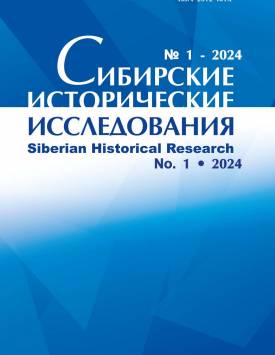Memory and Politics. The Caucasian War in the Memorial Space of Chechnya
The article is devoted to the analysis of the causes of the peripherality of memory of the Caucasian War in the memorial space of Chechnya (RF). The author presents a general picture of memory in this republic and wonders why it has such a form here and occupies such a place. The analysis of the available materials allowed us to conclude that the answer to the questions posed is the peculiarities of the existence of the republic as a subject of the Russian Federation and the complex history of interaction between the Chechen people and the Russian state. The work is based on several field studies by the author, during which more than sixty interviews were collected, including with memory actors in Chechnya, and field observations. An important source also was the analysis of the media, social networks and speeches of Chechen politicians. Published in accordance with the research plan of the Institute of Ethnology and Anthropology of the Russian Academy of Sciences. The author declares no conflict of interests.
Keywords
memory of the Caucasian war,
heroization,
victimization,
national Chechen heroes,
politics of memory in ChechnyaAuthors
| Tanaylova Valentina A. | Institute of Ethnology and Anthropology, Russian Academy of Sciences | valya00763@gmail.com |
Всего: 1
References
Блиев М.М., Дегоев В.В. Кавказская война. М., 1994.
Васильев А. Memory studies: единство парадигмы - многообразие объектов (Обзор англоязычных книг по истории памяти) // Новое литературное обозрение. 2012. № 5.
Волкан В., Оболонский А. Национальные проблемы глазами психоаналитика с политологическим комментарием // Общественные науки и современность. 1992. № 6. С. 31-48.
Дерлугьян Г. Адепт Бурдье на Кавказе: эскизы к биографии в миросистемной перспективе: авторизованный перевод с английского. М.: Территория будущего, 2010.
Исаева А. Герои Чечни: кто они? // Это Кавказ. 2020. 9 декабря. URL: https://etokav-kaz.ru/istoriya/geroi-chechni-kto-oni (дата обращения: 28.01.2024).
Копосов Н. Память строгого режима: История и политика в России. М.: Новое литературное обозрение, 2011.
Коц А. Кадыров открыл памятник первым "шахидкам" //Комсомольская правда. 2013. 16 сентября. URL: https://www.kp.ru/daily/26133.5/3024328/ (дата обращения: 28.01.2024).
Мороз О., Суверина Е. Trauma studies: История, репрезентация, свидетель // Новое литературное обозрение. 2014. № 1.
Нора П., Озуф М., Пюимеж Ж. Де, ВинокM. Франция-память / пер. Д. Хапаевой. СПб., 1999.
Чеченцы / отв. ред. Л.Т. Соловьева, В.А. Тишков, З.И. Хасбулатова; Ин-т этнологии и антропологии им. Н.Н. Миклухо-Маклая РАН; Комплексный научно-исследовательский ин-т им. Х.И. Ибрагимова РАН. 2-е изд., стереотип. М.: Наука, 2023.
Шнирельман В.А. Историко-этнографический музей: презентация традиции или репрезентация конструкции? // Этнографическое обозрение. 2010. № 4. С. 3-8.
Шнирельман В.А. Интеллектуальные дебаты постсоветского времени вокруг истории и культуры народов Северного Кавказа // Историческая и этнокультурная тематика в учебном, научном и общественно-политическом дискурсе Северного Кавказа / под ред. В.А. Тишкова. М.: ИЭА РАН, 2021.
Alexander J., Eyerman R., Giesen B., Smelser N., Sztompka P. (eds.) Cultural Trauma and Collective Identity. Berkeley, Calif.: University of California Press, 2004.
Assmann A., Clift S. Shadows of Trauma: Memory and the Politics of Postwar Identity, First edition. New York: Fordham University Press, 2016.
Bar-Tal D., Oren N., Nets-Zehngut R. Sociopsychological Analysis of Conflict-Supporting Narratives: A General Framework // Journal of Peace Research. 2014. Vol. 51, No. (5). P. 662675.
Campana A. The effects of war on the Chechen national identity construction // National Identities. 2006. No. 8 (2). P. 129-148.
Druey C. Stability without Peace in Chechnya // Politorbis. 2015. No. 60 (2).
Druey C., Shogenov M., Tanaylova V. Fighting for Self-Determination, Participation and Control: Statebuilding and the Role of Historical Memories in Chechnya (1986-2023). Peter Lang Publishing, 2024.
Edkins J. Trauma and the Memory of Politics. Cambridge: Cambridge University Press, 2003.
Eke S.M., Kuzio T. Sultanism in Eastern Europe: The Socio-Political Roots of Authoritarian Populism in Belarus // Europe-Asia Studies. 2000. Vol. 52, No. 3. P. 530-532.
Hirschberger G. Collective Trauma and the Social Construction of Meaning // Frontiers in Psychology. 2018. Vol. 9 (August), No. 1441.
Iliyasov M. Chechen ethnic identity: assessing the shift from resistance to submission // Middle Eastern Studies. 2018. Vol. 54 (3). P. 475-493.
Iliyasov M. The clash of collective memories in post-war Chechnya (manuscript).
Karp I., Kreamer C.M., Levine S. Museums and communities: the politics of public culture. Washington: Smithsonian Institution Press, 1992.
Kaeppler A.L. Paradise regained: the role of Pacific museums in forging national identity // Kaplan F.E.S. (ed.) Museums and the making of "ourselves". The role of objects in national identity. L.: Leicester Univ. Press, 1996. P. 19-44.
Laruelle M. Kadyrovism: Hardline Islam as a Tool of the Kremlin? // Russie. Nei. Visions, Ifri. 2017. No. 99.
Mitchell K. Monuments, memorials, and the politics of memory // Urban Geography. 2003. No. 24 (5). P. 442-459.
Muller W. Memory and power in post-war Europe: Studies in the Presence of the Past. Cambridge: Cambridge University Press, 2002.
Russel J. Ramzan Kadyrov's ‘illiberal' peace in Chechnya // Chechnya at war and beyond / ed. by Anne Le Huerou, Aude Merlin, Amandine Regamey, Elisabeth Sieca-Kozlowski. Routledge, 2014. P. 133-151.
Volkan V. Transgenerational Transmissions and Chosen Traumas: An Aspect of Large-Group Identity //Group Analysis. 2001. No. 34 (1). P. 79-97.

